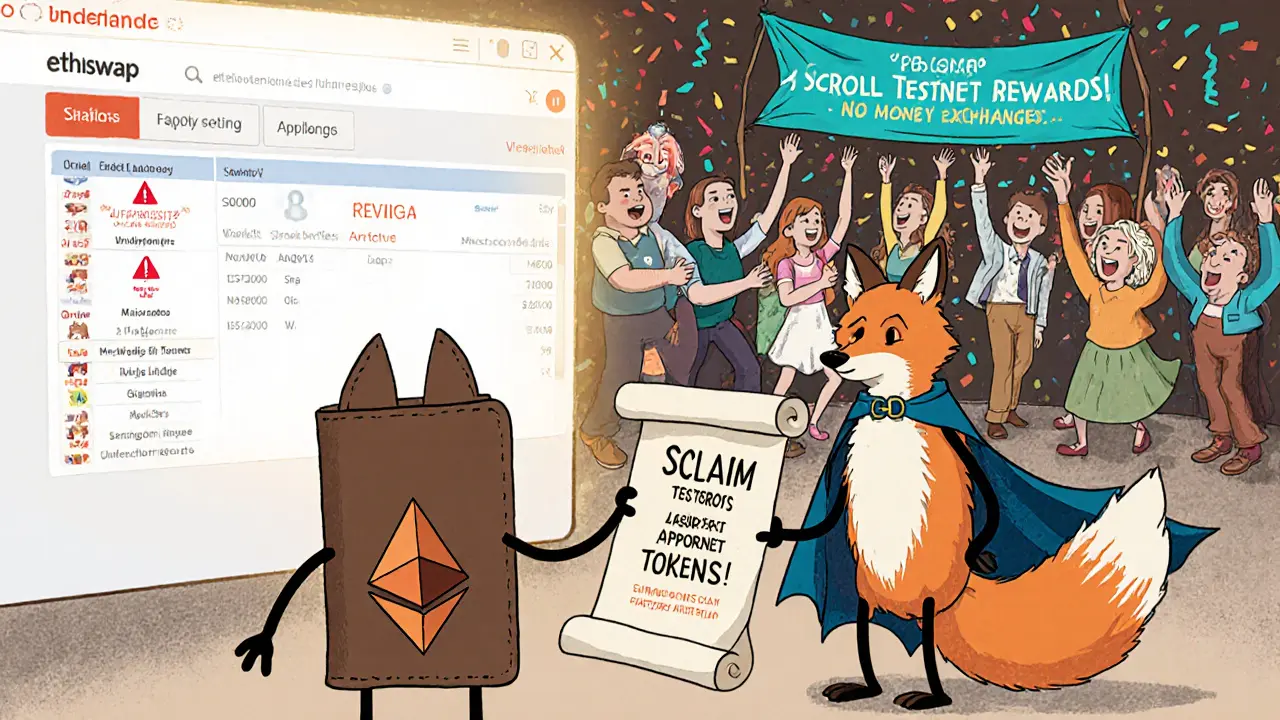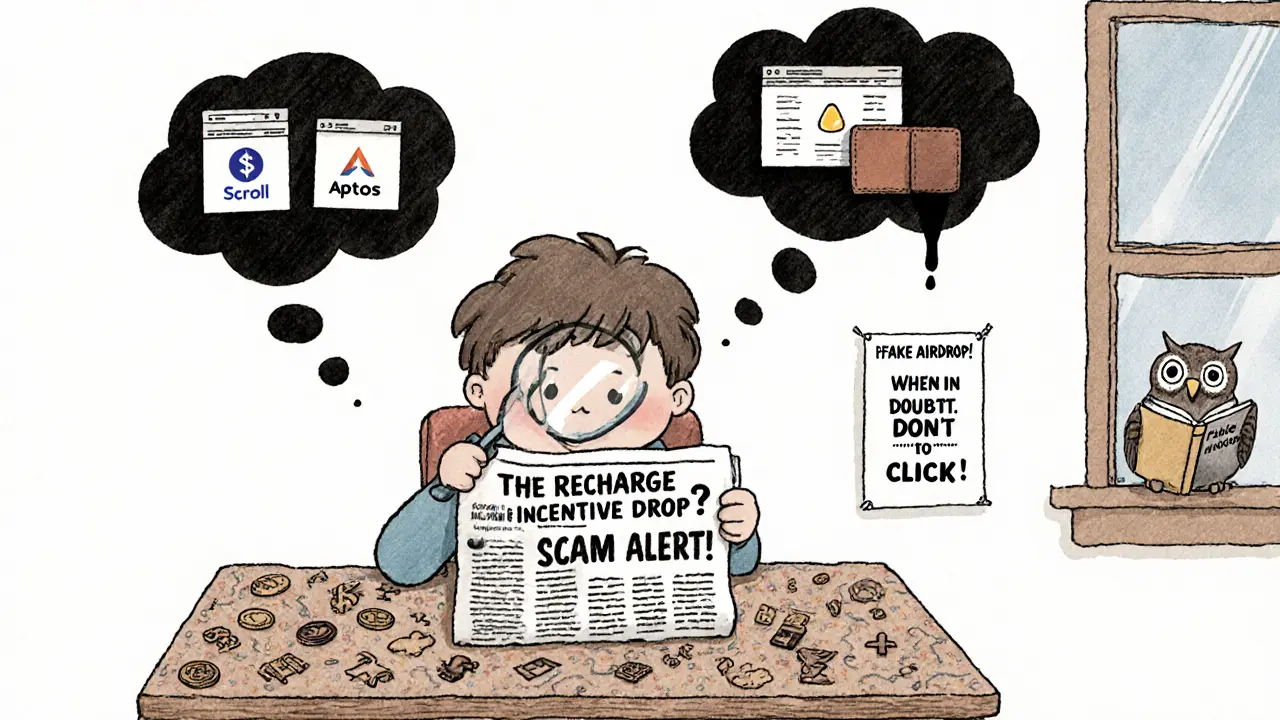Airdrop Safety Checker
Airdrop Safety Checker
Verify if an airdrop is legitimate by checking key security features and red flags. This tool helps you avoid scams like "The Recharge Incentive Drop".
There’s no official record of an airdrop called "The Recharge Incentive Drop" from any verified blockchain project. No whitepaper, no Twitter announcement, no Discord channel with verified moderators-just vague posts on Reddit and Telegram groups asking people to "claim your free tokens now." If you’ve seen this name pop up, you’re not alone. But here’s the truth: if you can’t find a single reliable source explaining what it is, who’s behind it, or how it works, then it’s not a real airdrop. It’s a red flag.
Why You Can’t Find Details About This Airdrop
Legitimate airdrops don’t hide in the shadows. They announce themselves clearly. Uniswap didn’t whisper about its UNI token drop-it published the eligibility rules, the snapshot date, and the exact number of tokens per wallet. ENS did the same. Even smaller projects like ZkSync or Scroll posted detailed guides on their official websites before launching their distributions. So why is "The Recharge Incentive Drop" invisible? Three likely reasons:- It doesn’t exist-someone made up the name to trick people into giving away wallet info or paying gas fees.
- It’s a pump-and-dump scheme-scammers create hype, get people to buy a new token, then vanish when the price spikes.
- The name is wrong. Maybe they meant "Recharge" as in a different project, like Recharge Labs or Recharge Protocol, but mixed up the branding.
Whatever the case, if you can’t find the official website, the GitHub repo, or a verified team behind it, you’re not dealing with a crypto project. You’re dealing with a trap.
How Real Airdrops Work (And How Fake Ones Copy Them)
Real airdrops follow a pattern. They ask you to do something simple: connect your wallet, complete a task, wait for verification. Then, weeks or months later, tokens arrive in your wallet. No one asks for your private key. No one asks you to send ETH or SOL to "unlock" your reward. No one sends you a link to download a "claim app" from a random website. Fake airdrops do the opposite:- They demand you send a small amount of crypto to "cover gas fees"-a classic scam tactic.
- They use fake logos that look like Uniswap, Arbitrum, or Solana-but the URL is slightly off (e.g., recharge-incentive-drop[.]xyz instead of recharge[.]xyz).
- They push you to join Telegram groups where bots spam you with fake screenshots of people "claiming $5,000 in tokens."
Here’s what real airdrops never do:
- Ask for your seed phrase or private key.
- Require you to pay anything upfront.
- Promise guaranteed returns or "100x gains."
- Use vague terms like "unknown details" or "limited time offer" without specifics.
If "The Recharge Incentive Drop" asks you to do any of those things, close the tab. Walk away.
What to Look for in a Legitimate Airdrop
Before you even think about clicking a link, check these five things:- Official website-Does it have a clean design, a team page, and contact info? Or is it just a landing page with a "Claim Now" button?
- Verified social accounts-Check Twitter/X, Discord, and Telegram. Are the profiles blue-checked? Are there real conversations, or just bots posting "I got 10,000 tokens!"?
- Smart contract address-Legit projects publish their contract on Etherscan or Solana Explorer. Look it up. If you can’t find it, skip it.
- Tokenomics-What’s the total supply? How many tokens are being airdropped? What’s the vesting schedule? If they won’t say, it’s a red flag.
- Community history-Has this team done other projects? Are they active in the space? Or are they new, anonymous, and pushing their first token?
Take the Uniswap airdrop as a benchmark. They didn’t just drop tokens. They gave governance rights to people who had used their protocol since 2018. That’s value for participation. "The Recharge Incentive Drop" doesn’t even say what you’re supposed to have done to qualify.

Real Airdrops That Actually Paid Out in 2025
If you’re looking for real opportunities, here are a few that delivered in early 2025:- Scroll Testnet-Users who interacted with its ZK-Rollup before mainnet launch received SCROLL tokens. No payment required. Just use the testnet, bridge assets, swap on DEXes.
- Aptos-Airdropped APT to early wallet holders and developers who built on its chain. Tokens were distributed based on on-chain activity, not social media.
- Linea-The ConsenSys-backed ZK-EVM chain rewarded users who transacted on its network before its official launch. Over 200,000 wallets qualified.
Notice a pattern? These weren’t advertised on TikTok. They weren’t pushed by influencers with fake testimonials. They were announced on official blogs, documented on GitHub, and verified by multiple blockchain explorers.
How to Protect Yourself
The crypto space is full of opportunity-but also full of predators. Here’s how to stay safe:- Use a separate wallet for airdrops. Never use your main wallet with your life savings.
- Never approve unknown contracts. If a site asks you to "approve spending," cancel it immediately.
- Use tools like DeBank or Zerion to monitor your wallet. If you see unexpected token approvals, revoke them.
- Join trusted communities. Stick to well-known Discord servers and verified Telegram groups.
- When in doubt, Google it. Search "[project name] scam" or "[project name] review"-you’ll often find warnings before you lose money.
There’s no shortcut to finding real airdrops. It takes time. It takes research. And sometimes, it means missing out on something that looks too good to be true.

What to Do If You Already Participated
If you’ve already connected your wallet to a site claiming to be "The Recharge Incentive Drop," act fast:- Check your wallet for any new token approvals. Use Etherscan or Solana Explorer to review transaction history.
- Revoke all approvals from unknown contracts. You can do this with Revoke.cash or Etherscan’s "Approvals" section.
- Don’t interact with the site again. Close it. Block it.
- Monitor your wallet for unusual activity over the next 72 hours.
- If tokens were sent to you, don’t sell them immediately-some scams send fake tokens that look real but are worthless.
Even if you didn’t send any money, your wallet could be flagged for future scams. That’s why prevention matters more than recovery.
Final Advice: When You Don’t Know, Don’t Click
The crypto world moves fast. New projects launch every day. But the most successful participants aren’t the ones chasing every shiny new airdrop. They’re the ones who wait. They verify. They ask questions. They walk away from anything that feels off."The Recharge Incentive Drop" doesn’t exist in any official capacity. No one is distributing tokens under that name. The lack of details isn’t a mystery-it’s a warning.
If you want real airdrops, focus on projects with clear documentation, transparent teams, and active communities. Skip the ones that rely on hype, secrecy, and urgency. The best airdrops don’t need to scream. They just need to deliver.
Is The Recharge Incentive Drop a real airdrop?
No, there is no verified record of an airdrop called "The Recharge Incentive Drop" from any legitimate blockchain project. No official website, whitepaper, or team has been published. The absence of details is a major red flag. It is likely a scam or a fabricated name used to trick users into connecting wallets or sending crypto.
How do I know if an airdrop is fake?
Fake airdrops often ask you to send crypto to claim rewards, request your private key or seed phrase, or direct you to unofficial websites. Real airdrops never ask for money upfront. Check for verified social media accounts, official documentation, and smart contract addresses on blockchain explorers like Etherscan. If you can’t find any of these, it’s not real.
Can I get scammed just by connecting my wallet?
Yes. Connecting your wallet to a malicious site can allow scammers to approve transactions or drain funds if you later interact with their contracts. Always use a separate wallet for airdrops. Never connect your main wallet. Use tools like Revoke.cash to check and remove unwanted approvals after visiting any airdrop site.
What are the safest airdrops to watch in 2025?
The safest airdrops come from established Layer 2 networks like Scroll, Linea, and zkSync, or major ecosystems like Solana and Aptos. These projects announce details publicly, publish testnet participation rules, and have transparent teams. Focus on projects that reward on-chain activity, not social media likes or follows.
What should I do if I already sent crypto to this airdrop?
Unfortunately, crypto transactions are irreversible. If you sent funds, you likely lost them. Immediately revoke all contract approvals linked to that wallet using Revoke.cash. Change passwords on any connected exchange accounts. Report the scam to your wallet provider and local authorities if possible. Learn from it-never send money to claim free tokens again.


